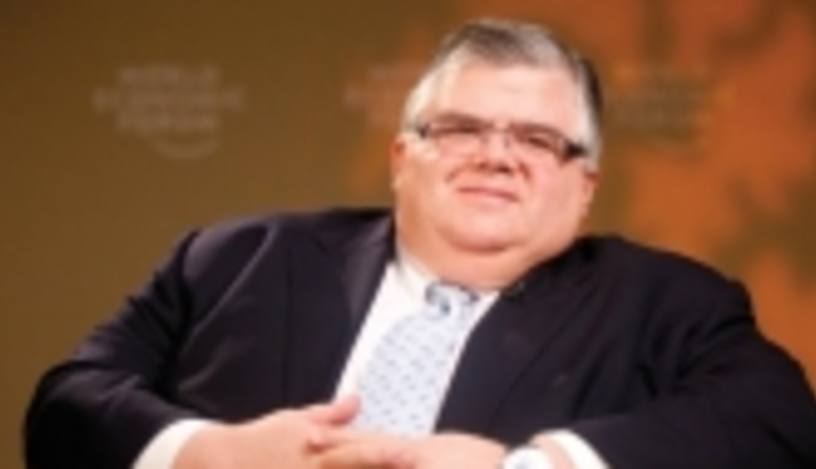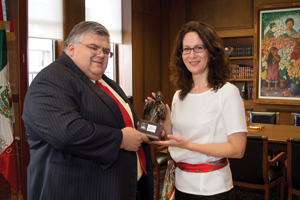After a disastrous recession induced by the global economic downturn, Mexico’s gross domestic product recovered in 2011 to show a growth of 4.5%; it is expected to be a lower but still healthy 3.5% this year. Furthermore, as of March, inflation was 3.73%, close to the central bank’s 3% target. Meanwhile, public finances are in order, the country's financial sector is well supervised and its banks highly capitalised.
Receiving The Banker’s award for Central Bank Governor of the Year at Banxico’s headquarters in Mexico City, Agustín Carstens talks about the achievements of the bank and Mexico in general. He remains a strong advocate of the bigger role the country and other emerging markets should play within international financial institutions – which, Mr Carstens says, keep on choosing the path of “pre-arranged” results when it comes to leadership.
Q: You have been very vocal in the past on the need to change the selection process to name the heads of the International Monetary Fund (IMF) – for which you ran against Christine Lagarde, the IMF’s current head – and the World Bank. What do you think about the recent appointment of Dr Jim Yong Kim, a US national, to lead the World Bank?
A: I think that the change in the methodology to choose the heads of these international financial institutions is long overdue. It should be through a process that is designed to identify the best possible candidate, and right now that is not the case. The US should be [made] to compete. I think that both [the US and Europe] have very strong candidates. They have a lot of talent, and I am sure they will be able to do well if it is an open competition. And, more than anything, that will give more legitimacy to these institutions. It is regretful that after 60 years, we still have a process of elections that is [determined] by pre-arranged results.
Q: What are the risks if the election process at the IMF and World Bank does not change in the short term?
A: The risk is that these institutions will lose their legitimacy in a way that universal membership would start to be affected. For example, [recently] there was a summit of the BRICS [Brazil, Russia, India, China and South Africa] and now they’re talking about [forming] a development bank among themselves. In a way, it is because they don’t feel they are fully represented in the World Bank. [As for the IMF], a very important part of its job is to do surveillance and policy recommendations to improve the performance of countries. Countries will be more likely to embrace and accept those policy recommendations if they feel they come from a non-biased, neutral, universal institution. At the end of the day, the main concern is that if we don’t strive for a neutral, legitimate institution, the efficacy [of policy recommendations] will suffer, and that will be regretful.
With [next year’s IMF] quota review it is very likely that developing and emerging markets will have a representation higher than 50%. That is a very important benchmark, a very important achievement by countries such as Mexico, Brazil, China, India, Russia and many others. The fact that, for example, I challenged Ms Lagarde, that Ngozi [Okonjo-Iweala, Nigeria’s finance minister] challenged Mr Kim, and we got some traction, that is contributing to having a non-biased competition at some point in the future.
Q: Mexico has emerged from its latest economic troubles, which were caused by the global economic difficulties. The central bank is also in very good shape, with healthy levels of reserves and the inflation rate being close to its target. Is the next year set to continue along a similar path?
A: In general, all the pieces are falling in place to converge into a more sustainable basis to our 3% inflation objective. But there are two items that have generated some volatility: one is the turbulence in capital markets that has translated into more volatility in the exchange rate, and the other is the prices of commodities, which are also quite volatile, and to some extent [been influenced by] external factors. So we need to be able to absorb these shocks in a more efficient way.
One aspect that we’re very happy about is that through time we’ve been able to show that exchange [rate] volatility does not necessarily translate itself into price pressure. In the past, that was not [always] the case. What we are expecting is that hopefully, as more progress is being made in the advanced economies to resolve their own crises, that will induce a more stable [global] environment and will give us a better external backdrop to really achieve our objectives. So far, the progress that we have made in fighting inflation is in itself [proving to be] a positive factor in inducing more growth.
Q: Another of Mexico’s achievements is that, after its own past crisis, banks are now highly capitalised and profitable. Will this continue and what will be the effect of new international regulation on the country’s banking system?
A: I think that we have learned from our crisis of 1994/95. Since then, we have dramatically upgraded our regulatory and supervisory systems. Not that this implies causality, but in a way the rest of the world’s regulation is catching up with what we [already] have. That is why it will be easy for Mexican banks to adjust themselves to Basel III. In a way, [banks] have already done the adjustment. There are some minor details that we need to take care of, but we will [do this] over this year so that we will be fully Basel III compliant. Also, [as our banks] have high capital-to-asset ratios, they will be [able] to contribute to economic growth, to a decent [economic] expansion.
Q: Are there benefits in having banks listed on the stock exchange, as most of the banks in Mexico are not listed locally?
A: I certainly don’t think that [stock exchange listing] has the potential that many other people are thinking that it has. But it would be a welcome development. Here in Mexico, foreign-owned banks are very transparent, have grown as if they were Mexican banks, and they disclose information according to the standards of the national banking commission, which is not very different from what they would have to disclose if they were listed on the stock market. [Some have suggested] that if they had Mexican owners, that would force them to [provide more local] credit, but we haven’t seen any bias from foreign banks in Mexico [compared] with completely national banks. As a matter of fact, given how things are in the world economy, foreign banks are eager to expand in Mexico. Consider the Spanish banks: one of the most important sources to build their additional capital requirements organically is through generating profits, and it is far more likely that they will generate profits in Mexico than in Spain.
Q: Mexico has an open economy, something that has increasingly set it apart from other large and fast-growing Latin American markets, such as Argentina and even Brazil, which have adopted protectionist measures to various degrees. What does this mean for the role that Mexico plays within the region?
A: Having a very open trade regime has served Mexico well. I think that it has made the Mexican industry very flexible, agile, with a capacity to adjust to different environments, to be able to compete, and gain access in markets in the south [of Latin America], in countries such as Brazil and Argentina. Also, the share of Mexican exports to the US has been increasing for the past three or four years, and we’ve been gaining ground against China. Having a stable macroeconomic environment, stable financial variables, but also having a relatively free market has proven to be a good combination for our industry to progress and be quite competitive.
Q: Does this mean that Mexico will keep on flourishing while other economies that have a different view will suffer?
A: I think so.














